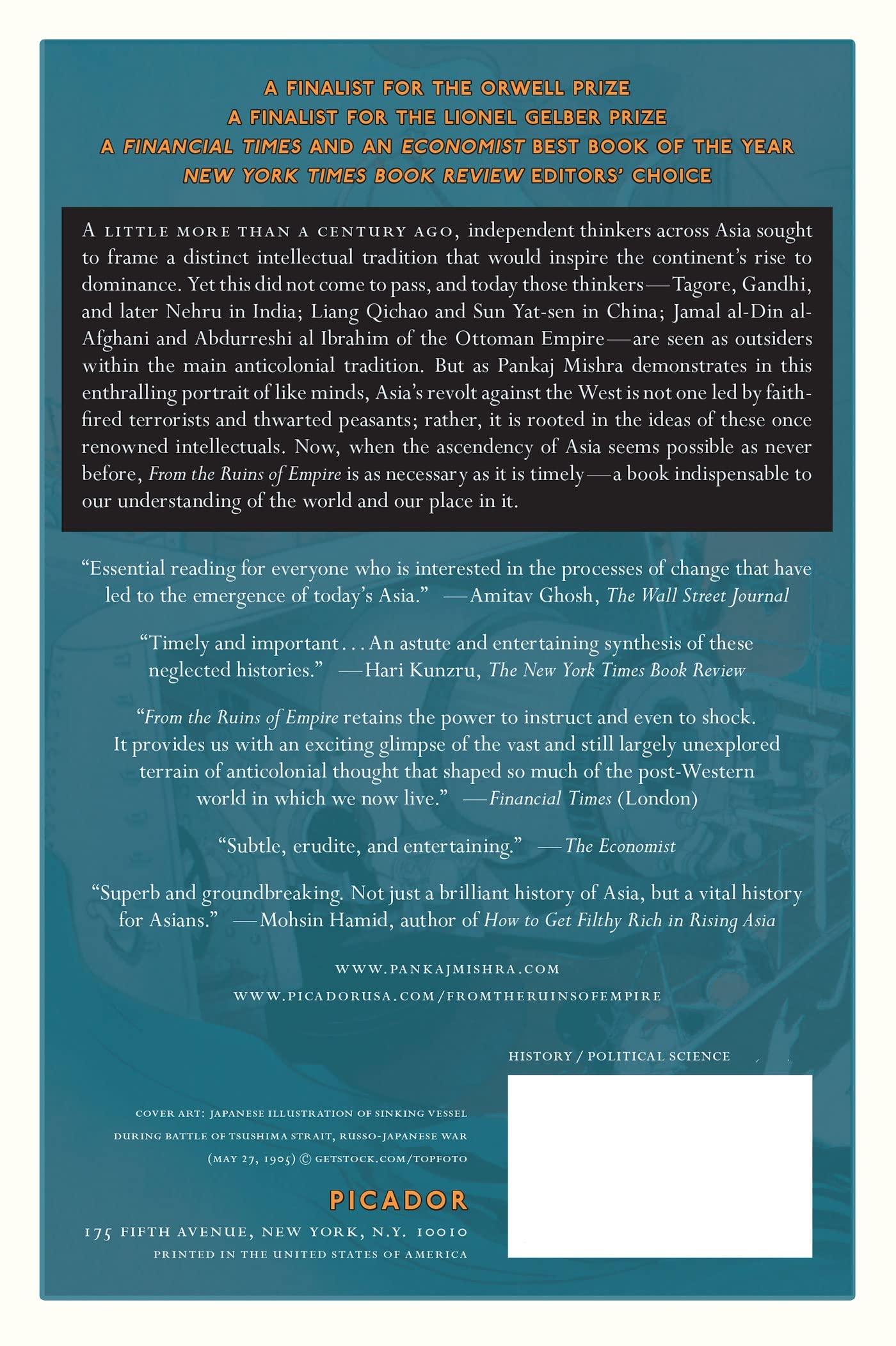


From the Ruins of Empire: The Revolt Against the West and the Remaking of Asia
N**I
Comment les nations colonisées de l'Asie ont vécu l'impérialisme occidental
Une lecture qui nous fait comprendre les mouvements de libération à travers le monde face aux exactions du Royaume uni et des autres puissances occidnetales
H**E
A New Look at the Ruins of Empire
From the Ruins of Empire: The Intellectual of Who Made Asia, by Pankaj Mishra presents an important world history as seen through the eyes of a number of internationally acclaimed Asian writers as well as the thoughts of some lesser known figures and events. This book is timely, thought provoking and a must read for anyone desiring a better understanding of events in today's Middle and Far East . The author is well informed and balanced, abstaining from any attempt to replace a Euro-centric view, with an Asia-centric one.Opening with the story of the first non-European country to vanquish a European power since the Middle Ages (the 1905 Japanese victory over the Russian navy) the awakening and reverberations of which provided the theme of this book.An introductory quote of a world famous philosopher serves as a front piece warning of a dated but arrogant grand Western historical speculation: wherein Hegel declared China and India of no concern to world history.Reflecting changes in world perspective, this books focus is on this very area -- Asia. Since that part of the globe was once the object of Western Imperial adventures, the author, through the thoughts and comments of various Asian intellectuals, expands his interest as he probes the political, economic, thoughts and ideologies, underlying Western colonial attitudes.It is here, that one witnesses the working out through adaptation and copying of the Western concept of "modernity:" the arrogant and racist bias of the occupiers and the concomitant resentment, envy and quiescent arrogance of the colonized The result is the social, political conflict and confusion emerging from decolonization and the rise of independent nation states.The main protagonists in this book are two itinerant thinkers and activists: Jamal al-Din al-Afghani (1873-97) a Muslim whose writings prepared the way for Ataturk, Nasser, Ayatollah Khomeini, and still animates the politics of Islamic societies. The other is Liang Qichao (1873-1929) perhaps China's foremost modern intellectual who bequeathed his obsessions with building state power to Mao Zedong Both of these men became major forces for change. Of particular note is the observation that the prevailing concern with Islam as a religion is not perhaps as significant as an apparent societal propensity for "fanaticism and despotism." By opening up new perspective Mishra hopes that we may be convinced that the "assumptions of Western power -- increasingly untenable-- are no longer a reliable vantage point and may even be dangerously misleading."The book is full of astounding quotes from various Asian writers, some of which demonstrate a high degree of discernment and prescience, as well as an accurate and succinct summary of the historical situation.The author closes with a very important assessment and warning, namely that in the future we may experience even bloodier conflicts generated by the need for precious resources as we strive towards world wide modernization. He categorically states that for China and India to enjoy the lifestyles of Europeans and Americans - "is as absurd and dangerous a fantasy as anything dreamt of by Al-Qaeda." Most sobering is the thought provoking conclusion: "the universal triumph of Western modernity which turns the revenge of the East into something darkly ambiguous, and all its victories truly Pyrrhic."Harry L. Stille
C**R
Critique of From the Ruins of Empire by Pankaj Mishra
This has been a mind-altering read. Far from being an anti-imperial rant, it is a careful compilation of the writings of three observers of European expansion into the east, chiefly British, French, Dutch and US. The annihilation of the Russian fleet by Japan in 1905 showed that Europeans were not invincible, and led to serious questioning of the West's colonising ways. Jamal al-Din al Afghani was born in Persia, Liang Qichao was Chinese and Rabindranath Tagore was Bengali, and all became well-known writers and critics of the "white man's" imperial pretensions. While the West spoke darkly of the "Yellow Peril", the East referred to the "White Disaster". Anyone interested in our troublous times could find this book enlightening.
A**R
The Anti-Imperialist Perspective
Pankaj Mishra has a penchant for irritating conservatives: consider his spats with British historian Niall Ferguson and professor Jordan Peterson. No surprise then that Mishra's book "From the Ruins of Empire" offers a contrast to traditional West-centered views of history that extol the virtues of capitalism, science, and democracy. Instead, Mishra pays more attention to Europe's economic subjugation of Asia and the Middle East throughout the 19th and 20th centuries.Viewed through the prism of lesser known intellectuals like Al-Afghani from Persia and Tagore of India, the book explores colonialism from the eyes of the oppressed. Japan's surprise victory over Russia in 1905 is the text's natural starting point and signals how the tables would slowly turn in favor of the so-called Rest of the World. With lucid prose, Mishra recounts the predatory behavior of Britain during the Opium Wars, the hypocrisy of Woodrow Wilson's Fourteen Points, and the remarkable rise of the Asian tiger economies after World War II.Yet, it's hard to see what was worth salvaging about the legacies of Mishra's intellectual heroes. The cosmopolitan Al-Afghani and charismatic Tagore offer little beyond their commonsense, reflexive anti-imperialism. Mishra deserves credit for this beautifully written, panoramic sweep of history, but his special cast of characters fail to capture the imagination. No shock then that when I asked my educated Iranian friends about Al-Afghani, they responded, "Who?"
A**R
Four Stars
Good explanation of what is happening in the Middle East. Its getting even for colonialism and imperialism
Trustpilot
1 day ago
1 month ago